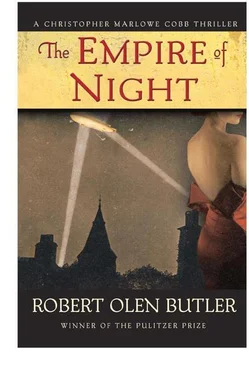Instead I said, “I can’t see her in any plan we might make from here on.”
Jeremy shook his head faintly no , disputing my assessment. “Your man and mine in London think highly of her.”
Hell. It even occurred to me to say, She’s my goddamn mother. I should know what we can and can not count on from her.
But I said, “I’ve got a bad feeling about her.”
“She seemed a tough bird.”
“She’s too much an amateur. Trust me on this.”
Jeremy flipped his head a little. “Have it your way,” he said.
Another of my mother’s theatrical triumphs. Impressing tough guy Erich Müller.
I would have it my way.
“Thanks,” I said.
And so we drank a bit more together, Jeremy and I, almost entirely in silence, and then we went up the back stairs to our rooms and we slept.
The next morning we sat at the same table and the innkeeper served us eggs and Wurst and black bread and her boy served us coffee. As we ate, Jeremy and I spoke of how short the hours had become. If the weather was right, this would likely be the night.
He said, “I’ll spend the morning in my anarchist’s workshop.”
But before we could get to the matter of my next move, a figure appeared in the door, at first in dark silhouette backlit by the morning light on the threshold of the dim bar.
A man in uniform.
He hesitated there, squared around to us, and then he approached.
Two pips on each shoulder. A captain.
He arrived before our table, straightened smartly to attention, and saluted us.
Jeremy’s hands happened to be free and he returned the salute, though casually.
I was lifting my coffee cup with my right hand. The cup had been rising when he arrived, and I continued on to take a sip.
The captain patiently held his salute.
I lowered the cup and placed it on its saucer.
I saluted.
He snapped off a finish to his.
“Colonel,” he said, bowing his head to me. “Major.” A bow to Jeremy. Then back to me: “I am sorry to have intruded on your breakfast.”
“Not at all, Captain,” I said. “Would you like to sit?”
“Thank you, sir, but I am simply to give you a message and wait upon you.”
I lifted my chin a little to encourage him to proceed.
He said, “My commanding officer, Colonel Franz von Ziegler, commandant of the airship base, has taken note of your arrival, and he sends his warmest regards. He offers his personal assistance in any way that might be useful to you.”
“Thank you, Captain,” I said. “Perhaps I can visit with the colonel on the base at his earliest convenience.”
“Of course, sir. If you would like to do so this morning, he has instructed me either to wait for you or to return for you.”
“His schedule?” I asked.
“Is flexible at any hour till noon.”
“Return in an hour,” I said.
“I will wait outside with the colonel’s automobile.”
The captain straightened and clicked his heels and saluted once more.
I returned it. He did a sharp about-face, and he strode across the barroom and out the door.
Jeremy and I watched him go. Then we looked at each other.
“As we’d hoped,” Jeremy said.
“The commandant’s eager,” I said.
“He expects to fear you.”
The captain was leaning against the commandant’s camouflaged Horch phaeton when I emerged from the inn with my Iron Cross on my chest, my dispatch case over my shoulder, and my Luger on my hip. He snapped to attention at my approach.
He made a move to open the front passenger door. I recalled his commandant sitting in that position when we passed yesterday on the main street. But I was an arrogant son of a bitch named Klaus von Wolfinger, a secret service colonel from the Foreign Office in Berlin, so I narrowed my eyes at him. He instantly recognized his mistake. He slammed the passenger door shut and opened the rear door in the tonneau. He would be made to act the proper chauffeur for me.
“Sorry, sir,” he said.
I gave him a minute nod and climbed in.
The door clicked gently shut behind me.
We drove in silence down Wald-Strasse, across the railroad tracks, and out into the barley fields on the road to Uckendorf. Less than a mile later we turned onto a two-lane macadam leading into the air base, a thousand acres of flat, cleared, fallow farmland stripped empty for airship landing and maneuvering, but with a cluster of structures a half mile ahead, the centerpiece being a Zeppelin hangar, growing larger by the moment, clearly outsized, massive. Measureable now: longer than the greatest Atlantic steamship and twenty storeys high.
We drew near. End on, the hangar was an octagon cut off at the knees and with a slight pitch to its upper edge, the squared-off frontal outline of an airship. The doors were shut. Along each flank sat wide, low, corrugated steel buildings. Storehouses and barracks. A telegraph station. And an administrative building, where we now parked.
As I stepped from the automobile and into the shadow of the hangar, its vastness seized my chest and lifted me. Like I once felt walking State Street in my Chicago, passing beneath the Heyworth Building and the Mandel Brothers Building, Marshal Field and the Masonic Temple.
The air base administrative building was steel and plain but it was smaller than the other buildings and had a brick chimney in the side wall. We went in. Two enlisted men at desks in an outer office leaped to their feet, shooting off salutes that the captain and I returned, and we went down a narrow corridor and straight into the main room of the place.
From behind a large, quartered-oak desk rose the commandant, a full colonel like me, but having arrived at the rank at a more traditional pace. He was perhaps sixty. He was clean-shaven except for a sword-blade gray Wilhelm mustache.
I waited for the office door to click shut behind me, and I stepped to the front of the colonel’s desk, stopping between two oak chairs that were arranged to face him. He and I straightened and shared a simultaneous salute. I’d watched him take note of my Iron Cross as I approached. He did not have one or was not displaying it.
And then, as our saluting hands fell, we both glimpsed something that we now subtly displayed to each other, by very slightly and very briefly turning our faces to the right.
We each had a Schmiss.
This was good.
I offered my hand. “I am Colonel Klaus von Wolfinger,” I said.
He offered his. “Colonel Franz von Ziegler,” he said. “Commandant of His Imperial and Royal Majesty’s Airship Station at Spich.”
We shook.
Ziegler said, “Colonel, you have a fine medal there.”
My hand moved to my chest beneath the Iron Cross. “Thank you,” I said.
He smiled. “Of course that. But I meant your scar.”
I returned the smile, though faintly. “And you, sir.”
His was particularly wide, as broad as my thumb.
He figured he knew how to read my look. He said, “I drank foolishly long and much upon that night and inflamed it.”
He was a purist. And he was solicitous of my goodwill. He did not want me to think he’d exaggerated the wound with horsehair.
“Mine was badly mended,” I said.
We flashed a quick, comradely smile at each other.
“Bonn,” he said, identifying his university.
“Heidelberg,” I said. “Borussia?” I asked. The university fencers all were members of clubs, each school having a variety of these, differentiated in a de facto caste system by occupation or wealth or nobility of blood line. Borussia was Kaiser Wilhelm’s club in his Bonn university days, the most elite in the country.
“You honor me by the question,” the colonel said. “But no. Guestphalia.”
Читать дальше












